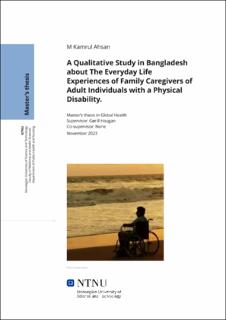| dc.description.abstract | Background: Family caregivers in Bangladesh play an important role in providing care to physically disabled patients who can't do work or walk without any form of assistance. Although family caregivers' assistive part in making a disabled person's life easier and less miserable is known the obstacles they face in providing care and the coping techniques they implement are still understudied in Bangladesh. So, the purpose of this study is to explore the day-to-day life experience of family caregivers in Bangladesh taking care of physically disabled adult persons.
Aim: This study aims to identify common burdens of family caregivers, barriers to providing care, measures they are taking, social responses toward them, and how they are coping with them.
Method: A qualitative research method was adopted by conducting interviews of 11 participants (adult family caregivers including 7 females and 4 males) following a semi-structured interview guide at the Centre for Rehabilitation of Paralyzed, Savar, Dhaka from January 28 to February 03, 2023. The interviews were transcribed verbatim into Bengali first and then translated to English before analysis. A thematic Analytical approach was taken to analyze and interpret the data. The data were read repeatedly to make sense as a whole, then meaning units were extracted and codes were produced by systematic categorization. These codes were then sorted according to similarities and differences to group them under sub-themes. Coherent subthemes were then divided into unique themes to produce the result.
Results: Five themes emerged: (1) Unfolding a Family Caregiver's Journey, (2) Hurdles to Overcome: Sacrifices and Burdens, (3) Effective Caregiving: Obstacles, Measures, and Techniques, (4) Social Responses and Coping Strategies, and (5) Supports and Expectations: Making The Journey Easier. Family caregivers develop their roles after certain sacrifices and considerations that involve physical and emotional burdens. The positive aspects of caregiving were personal satisfaction and development, being rewarded afterlife, and connection buildup with the care-receiver. Inaccessible roads and transports, a lack of necessary ramps, lifts, and assistive devices, and financial crises made it harder for them to ensure treatment and rehabilitation for their patient. Key management techniques were patience, training, support from family and friends, and believing in God. Society mostly showed negative attitudes towards caregivers; these were handled by silence, ignoring, self-understanding, and sometimes raising their voices and giving constructive messages to society.
Conclusion: Family caregivers' roles in Bangladesh are broader and more complex than they appear. Collaborative measures, policies, and continued further studies are requirements to ensure their well-being.
Keywords: Family Caregiver, Physically Disable, Disability, CRP, Centre for Rehabilitation of Paralyzed, Savar, Burden, Qualitative Analysis, Bangladesh, Caregiver Experience, Coping Techniques, Society Response, COVID-19, Pandemic, Pregnancy in Disability, Rehabilitation, SDG, UN, Policy, Caregiver Peer Support. | |
